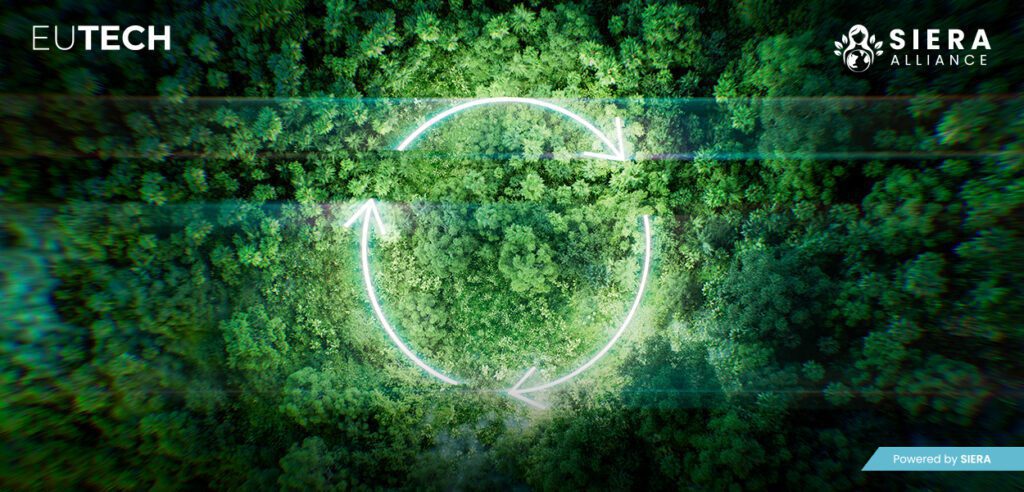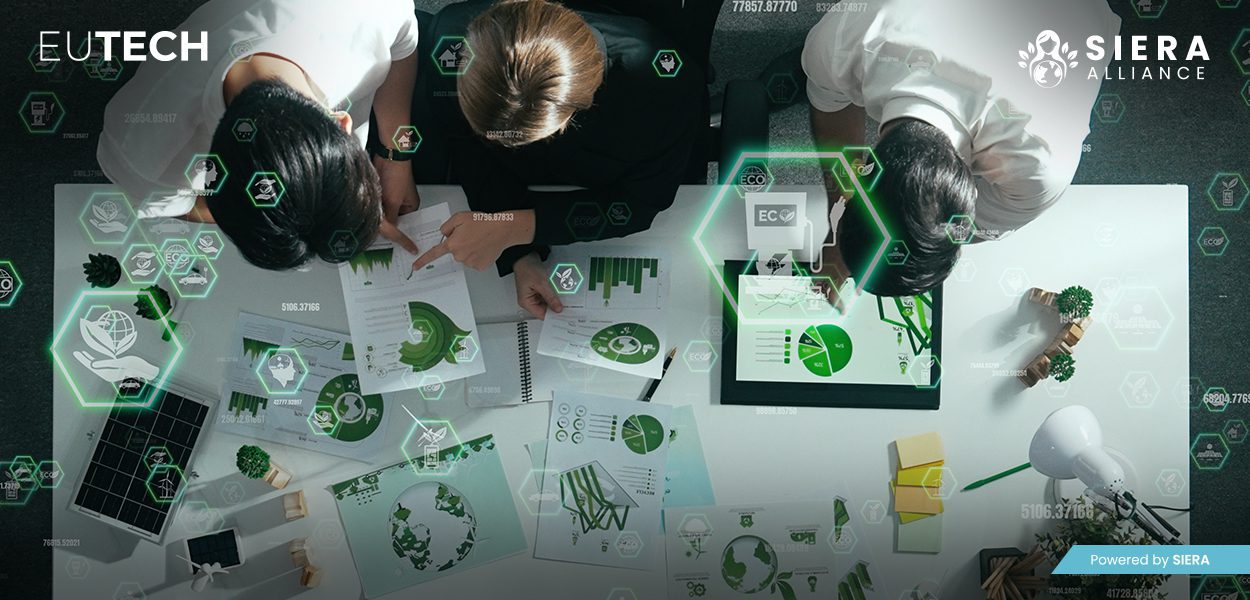On 5th February 2025, the EUTECH – Technology Council powered by SIERA Alliance hosted a compelling webinar titled “Maximizing Resource Efficiency through Circular Economy in Tech.” Moderated by Melanie Klettl, the session brought together thought leaders to discuss the critical challenges and opportunities for the tech sector in implementing circular economy practices. Antonia Sophie Modersohn, the keynote speaker, emphasized the need for businesses to adopt sustainable practices in tech operations to maximize resource use and minimize waste. The panel also highlighted the growing importance of circular supply chain models in driving long-term sustainability.
Key Challenges in Resource Efficiency in Tech
The tech sector faces several challenges that hinder the effective implementation of circular economy models. These challenges include:
1. Inefficient Energy Loops in Tech Operations
The rapid growth of data centers driven by AI is expected to triple power consumption by 2030, leading to unsustainable energy use. The increasing energy demand—estimated to reach 150 TWh by 2030—puts immense pressure on resources and infrastructure. Effective integration of renewable energy and AI-driven management is crucial to reducing energy consumption and making these operations more resource-efficient.
2. Limited Circular Resource Flow
The global e-waste crisis is escalating, with projections showing a rise from 62 million tons in 2022 to 82 million tons by 2030. With only 22% of e-waste being recycled, valuable materials are being lost, while toxins from improper disposal create environmental risks. The implementation of circular practices, including better recycling systems and longer product lifecycles, can significantly reduce this waste.
3. High Environmental Impact from Raw Material Extraction
The extraction of raw materials for tech production, such as cobalt and lithium, contributes to deforestation, water stress, and global greenhouse gas emissions. As the tech sector continues to rely on finite resources, businesses must focus on adopting green mining technologies and implementing sustainable supply chains to mitigate environmental impact.
4. Linear Resource Extraction and High Waste Generation
The reliance on a linear economy in tech manufacturing, where products are made, used, and discarded, exacerbates waste generation. With growing environmental harm, the adoption of closed-loop systems and sustainable manufacturing practices is necessary to promote sustainability in the tech sector.
5. Inadequate Urban Infrastructure for Circular Practices
While smart cities hold the potential to transform resource management, infrastructure gaps in many urban areas hinder the widespread adoption of circular economy principles. Without the necessary digital systems and technologies to track materials and manage waste, cities struggle to integrate circular practices effectively.

Solutions and Recommendations
To overcome these challenges, the webinar highlighted several innovative solutions for maximizing resource efficiency in tech through circular economy practices:
1. Integrating Renewable Energy in Tech Operations
Integrating renewable energy into tech facilities can drastically reduce emissions and lower energy consumption. Companies should adopt on-site renewable solutions like solar and wind, utilize power purchase agreements (PPAs), and invest in smart grids to optimize energy use.
2. Building Information Modeling (BIM) for Circular Design
BIM helps enhance resource efficiency, reduce waste, and improve e-waste management. By incorporating material passports and design for disassembly, companies can extend product life cycles and improve recycling rates, addressing the growing e-waste challenge.
3. Promoting Circular Supply Chains
Circular supply chains involve sourcing recycled materials and reducing waste at every stage of production. By collaborating with suppliers to ensure sustainable procurement, companies can improve their resource efficiency and reduce their environmental footprint.
4. Leveraging Smart Technology for Waste Management
Smart infrastructure, powered by IoT and AI, can help optimize waste management by enabling real-time tracking of materials, improving recycling efficiency, and facilitating better resource recovery. These technologies are essential for advancing circular economy goals in tech.
5. Sustainable Manufacturing and Green Chemistry
Green chemistry principles can help reduce hazardous waste, while closed-loop water systems in manufacturing can conserve resources and lower wastewater discharge. Implementing these sustainable practices is essential for reducing environmental impacts in tech manufacturing.
Transformation Opportunities in Tech
Adopting circular economy principles offers several transformative opportunities for the tech industry:
| Transformation Area | Benefits | Statistics |
| Energy Efficiency in Data Centers | Reduces operational costs and carbon emissions | AI-driven management can cut energy use by 10–20%. |
| Extended Product Lifecycles | Decreases waste and enhances product value | BIM can reduce energy consumption by 30%. |
| Cost Savings through E-Waste Recovery | Reduces landfill waste and recovers valuable materials | Recycling e-waste could unlock $62 billion annually. |
| Improved Resource Efficiency | Maximizes material use and reduces environmental impact | Circular design can save up to €630 billion annually. |

Best Practices for Maximizing Resource Efficiency in Tech
To integrate circular economy practices into tech operations, companies should consider the following best practices:
- Adopt Circular Product Designs: Design products with recyclability in mind, using modular components that can be easily disassembled and reused.
- Promote Renewable Energy: Invest in on-site renewable energy and optimize energy use through smart grids and AI-driven management systems.
- Improve E-Waste Management: Implement IoT-enabled tracking and AI-powered sorting for efficient e-waste recycling and resource recovery.
- Collaborate with Stakeholders: Engage with suppliers, regulators, and consumers to build a more sustainable, circular tech ecosystem.
Upcoming Events and Opportunities
Stay informed about future events hosted by the Technology Council powered by SIERA Alliance. For more insights into sustainable practices, networking opportunities, and the future of circular economy, visit the SIERA Alliance Event Calendar. Join us as we continue to advance resource efficiency and sustainability in the tech sector.
Conclusion: Driving Sustainability in the Tech Sector
The tech industry stands at a crossroads, with the opportunity to transform its operations through circular economy principles. By adopting renewable energy solutions, smart technology, and sustainable manufacturing practices, companies can reduce their environmental impact while improving efficiency and profitability. Collaborating with organizations like SIERA Alliance, EUTECH, and MuP Group will help businesses create actionable sustainability strategies that support a more circular and responsible future for the tech industry.
To learn more about how SIERA Alliance can support your journey towards sustainable tech operations, explore our website. Join us in building a sustainable future for the tech sector.








